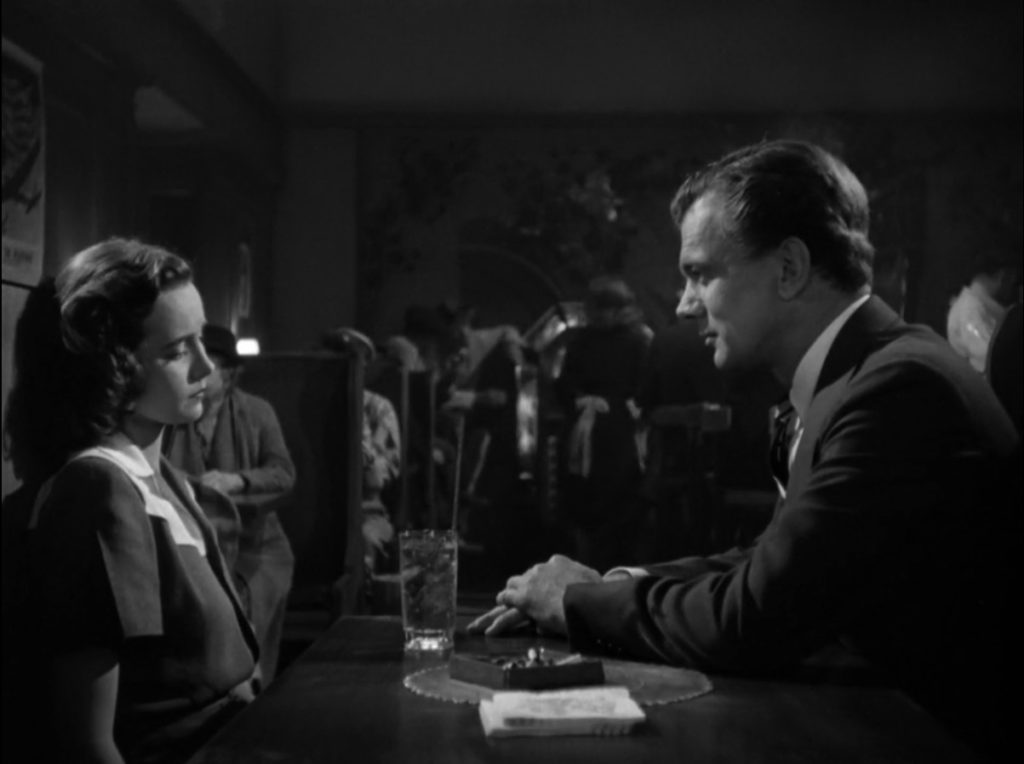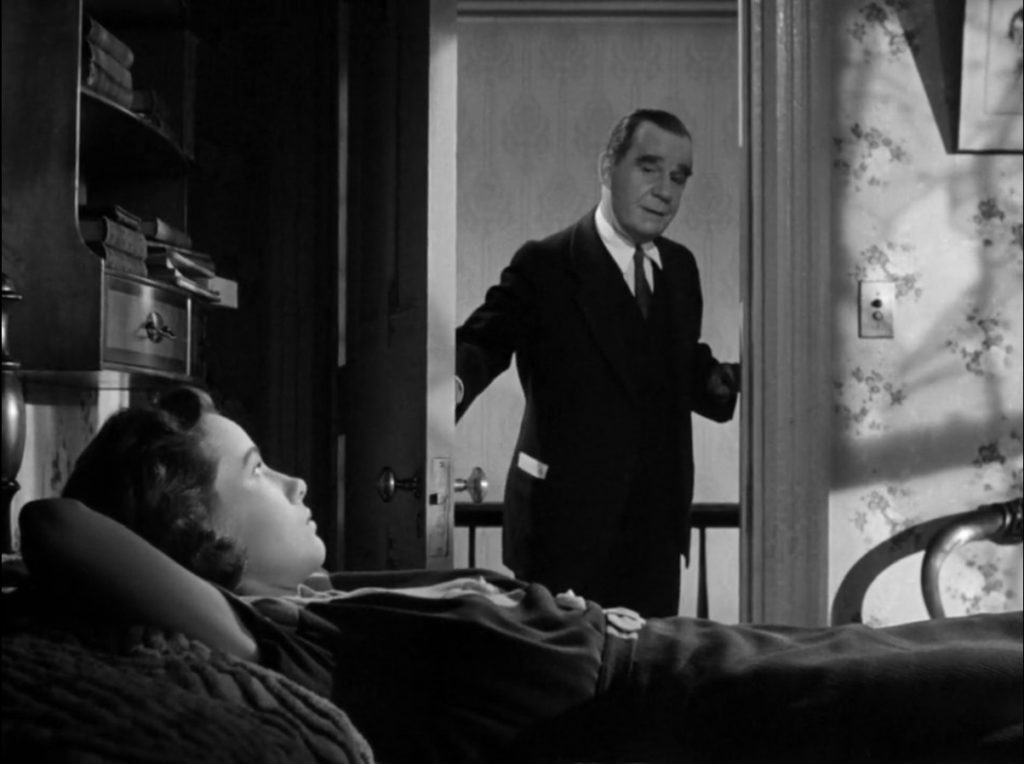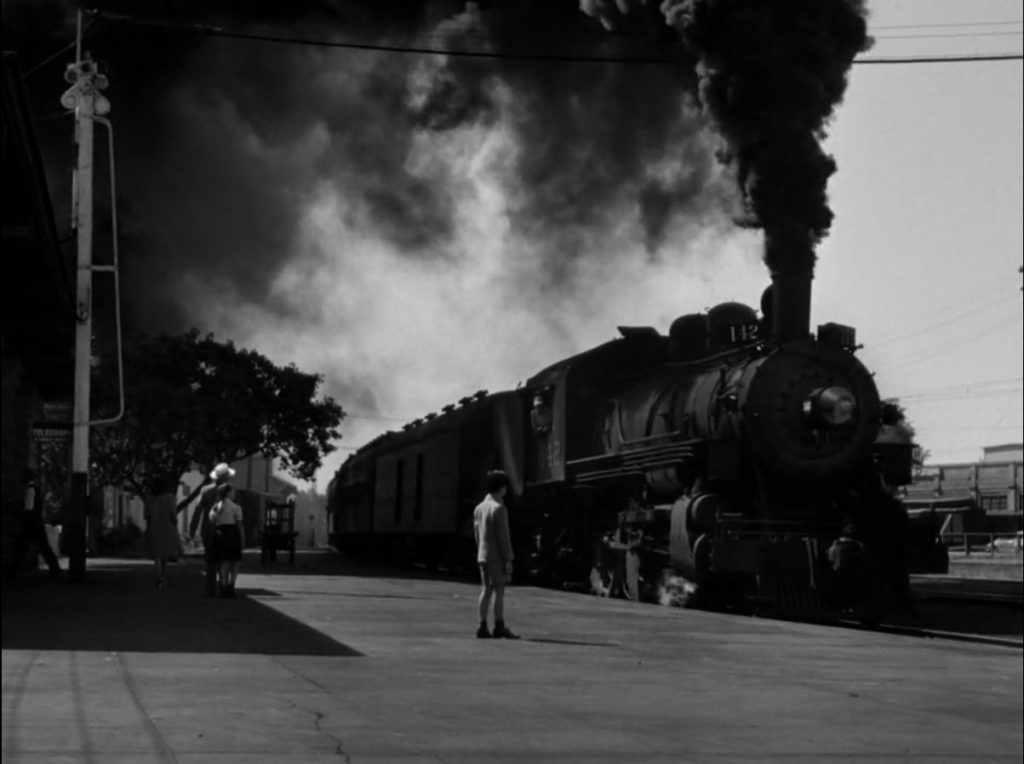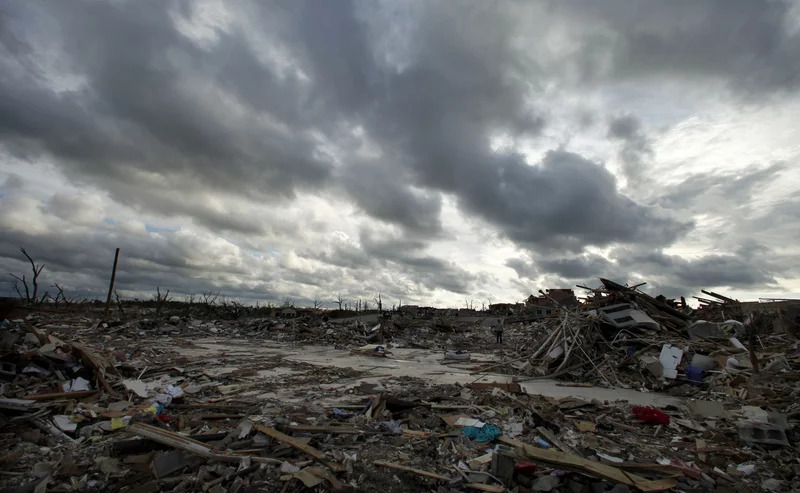| Dylan Hawthorn |

Shadow of a Doubt plays at the Heights Theater on Thursday, April 11. Visit trylon.org for tickets and more information.
Spoiler alert for Shadow of a Doubt
About ten minutes into Shadow of a Doubt, Charlotte “Charlie” Newton (Teresa Wright) lies in her bed, hands behind her head, staring at the ceiling. The camera had been relishing in the domestic bliss of her hometown, Santa Rosa, with lush orchestral arrangements accompanying its shots of mountains, crosswalks managed by a smiling police officer, and the exterior of Charlie’s house. As it zooms in on her, the score gives way to mournful violins. Her father Joseph (Henry Travers) enters and her expression shifts from disinterested to resentful.

Mr. Newton asks what’s wrong, and she replies:
“Do you ever stop to think that a family should be the most wonderful thing in the world? But this family’s just gone to pieces?”
“We have?”
“Of course we have. We just sort of go along and nothing happens. We’re in a terrible rut. It’s been on my mind for months. What’s going to be our future?”
Eventually, after complaining about the monotony of the Newton family’s daily routine, the lack of depth in their conversations, and the amount of work her mother Emma (Patricia Collinge) does day after day, Charlie has a brilliant idea and runs down the stairs to send a telegram. As she tells her mother,
“I know a wonderful person who will come and shake us all up. Just the one to save us!”
Her Uncle Charlie Oakley (Joseph Cotten) is her designated savior. He’s traveled the world, he’s seen excitement, he understands the way she thinks, and she believes he’s perfect for this task. Unbeknownst to her, the gears for his return are already in motion.
The disdain with which Young Charlie (as Teresa Wright’s character appears in the credits) tells her father that “we eat and sleep and that’s about all” resonates with me. I don’t know when I noticed my own ennui, but I know it began extremely early. Even in elementary school I felt exhausted by day-to-day life. Waking up, learning to add and subtract, recess, playing at home, eating dinner, and going to bed—it all felt like drudgery. Eventually, I spoke to our school guidance counselor about it.
“I’m just so bored,” I whined, attempting to draw a perfect circle on the whiteboard.
“Well, what would make it better?” she asked.
“I don’t know, anything.” I stopped, thought for a minute, and turned around. “Maybe a tornado could come hit town.”
“Oh, you don’t mean that.”
“I do! I do! The news would come, and there would be cameras! That would be exciting.”
Tornadoes were fascinating to me. Growing up in southern Missouri, nestled against Tornado Alley, we were deeply familiar with them. About once a year the sky turned green, the sirens wailed, and I was whisked away to congregate in the house of a friend who had a basement. The wind whipped outside as the kids played air hockey, and eventually we ascended the stairs to peek out at what Mother Nature had wrought—a ripped shingle here, a fallen tree there, trash and puddles on the sidewalks. Sometimes the news would indeed come to wherever the tornado hit, and the next morning before school I’d eat my Cheerios and turn on the TV to see a reporter from the city stand in front of some fallen branches. The station would cut to footage of the vortex swirling through the sky, so symmetrical and mystifying.
As this is a movie directed by Alfred Hitchcock, it isn’t shocking to learn that Uncle Charlie is a murderer. Even before we understand the extent to which he will “shake up” the family, we get hints that all is not well when the second his train pulls into the Santa Rosa station. The train stops uncomfortably close to the camera and the thick smoke it belches chokes the sun out of the scene.

Young Charlie takes a little longer to piece together clues, but eventually she realizes her uncle is the serial strangler pursued by law enforcement. She can’t help but wonder why. How is her mother’s beloved baby brother a person that can callously steal women’s lives and jewelry? Part of it is definitely misogyny (see his monologue calling his victims “fat, wheezing animals” at an otherwise peaceful Newton family dinner). But while Uncle Charlie acts in a way revolting to his niece and society at large, he suggests that the roots of his actions lie in an emotion familiar to viewers. As he tells young Charlie:
“You’re just an ordinary little girl, living in an ordinary little town. You wake up every morning of your life and you know perfectly well that there’s nothing in the world to trouble you. You go through your ordinary little day, and at night you sleep your untroubled ordinary little sleep, filled with peaceful stupid dreams. And I brought you nightmares. Or did I? Or was it a silly, inexpert little lie? You live in a dream. You’re a sleepwalker, blind. How do you know what the world is like? Do you know the world is a foul sty? Do you know, if you rip off the fronts of houses, you’d find swine? The world’s a hell. What does it matter what happens in it?”
His condemnation echoes young Charlie’s earlier complaints and even continues the theme of sleeping as a boring task to be resented. It seems like Uncle Charlie knows exactly what his niece was thinking. Both think they have the answer for what they need and why the people around them are failing to meet their expectations. Young Charlie, in a tumultuous season of life, is searching for impossible answers and fearing the advent of even more drudgery that a homemaker such as her mother might face. Uncle Charlie decided to take matters into his own hands years ago. Rather than wait around for what he considers the inevitability of settling down to hit him, he has become the storm.
On May 22, 2011, we sat in front of our televisions monitoring the progress of severe weather 130 miles to our west. Unable to move, my mom flipped between local and national news channels following it. Since I was a teenager and had experienced many twisters, it was a familiar routine. But instead of the familiar childhood anticipation of wondering if we’d need to speed to the neighbors’ basement and hoping to see a familiar sight on the news, we watched with horror as a multi-vortex tornado slammed Joplin, MO.
The storm was eventually declared one of the costliest and deadliest tornadoes in United States history. Winds with peak speeds of 200 mph killed 161 people and flattened homes, schools, and hospitals. The city sustained about $3 billion in damages, and the mental and emotional toll was immeasurable.1

Photo by Charlie Riedel, Associated Press
Eventually, when the footage became too much, I went to my room and got ready for bed. Thunder began to gently rumble in the distance and a steady rain drummed against the roof. Looking at the drops streaking our windows, I realized this was the remnants of the storm that had so damaged Joplin. That deeply misguided wish for a tornado to “shake us all up” now disgusted me and became a rejection of the rain and all it had cost.
Is this really what you wanted? I asked myself, before falling asleep.
I suspect Young Charlie, Uncle Charlie, and I aren’t alone in our feelings of ennui. Art engages with the theme of “going along” with life and wondering how to create a life worth living too frequently for it to be an unusual emotion. It may feel isolating to experience, but Shadow of a Doubt and Hitchcock’s other works exploring this theme speak to these realities.
Most of us, however, don’t cope with the struggle by completely rejecting safety and routine. We do what we can to seek safety and construct meaning even if it feels silly sometimes. This doesn’t mean we have to follow socially prescribed models to the letter; Young Charlie might not ever take solace in homemaking like her mother. It does mean that we find the small routines that line up with our values and cultivate them. Once these are threatened, even if we didn’t know they existed, we suddenly prefer the occasional ennui. For example, Young Charlie sees only her uncle’s travel and exciting city life and thinks this is what she too wants. The moment she realizes the truth though, she screams at her uncle to go away. Perhaps, she realizes, “just going along” isn’t so bad after all.
Shadow of a Doubt is full of characters that have embraced this quiet life. Emma puts great care into her clean house and her family dinners. The police officer spends his days cheerfully telling people when to cross the street. And while Joseph and his friend Herbie (Hume Cronyn) have a morbid fascination with escaping their average lives via discussions of murder, they too ultimately conform to their roles in the Santa Rosa community. Uncle Charlie, so loathing of the world he considers to be hell, is the outlier. His existence is exciting in a terrible way, but his rejection of safety and routine comes at the cost of his life and the respect of his niece.
Now, I recognize that stability, safety, and consistent relationships are a privilege. After understanding pain and suffering a little more, I know there are worse things than being a little bored sometimes and wondering what I “should” be doing. In the fictional Santa Rosa, I imagine Young Charlie’s experiences lead her to the same conclusion.
Footnotes
1 KY3 Staff, “Eleven Years Later: Remembering the May 22, 2011 Tornado in Joplin,” Ky3.com, May 21, 2022. https://www.ky3.com/2022/05/21/eleven-years-later-remembering-may-22-2011-tornado-joplin/.
Edited by Olga Tchepikova-Treon
